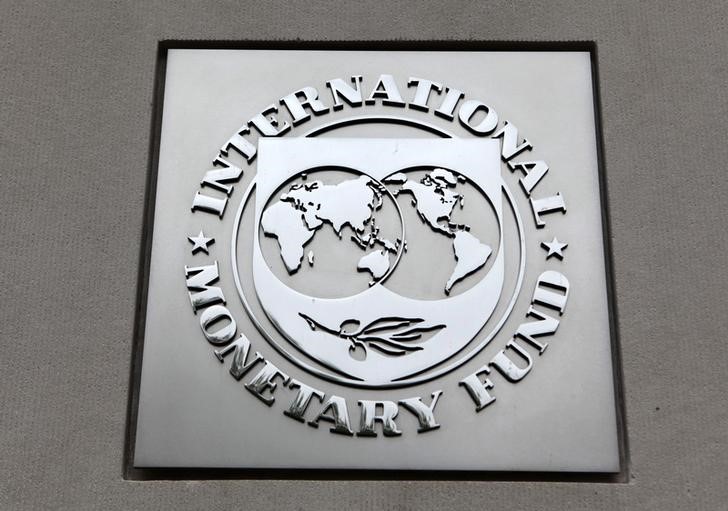By Andrea Shalal
WASHINGTON, Feb 8 (Reuters) - Nigeria will need to increase
its value-added tax (VAT) rate to at least 10% by 2022 and 15%
by 2025 from 7.5% now to boost revenues after it recovers from a
recession, the International Monetary Fund said on Monday.
In a report, the Fund also said the government must continue
to pursue reforms to help overcome the twin shocks of the oil
price crash and the COVID-19 pandemic.
"The Nigerian economy is at a critical juncture. Policy
adjustment and reforms are urgently needed to navigate this
crisis and change the long-running lackluster course," it said.
VAT was raised from 5% in February 2020 but disruptions due
to the pandemic have delayed full implementation of the
increase. The rate remains among the lowest in the world and
less than charged by other major oil-exporting nations including
Nigeria's West African neighbours, the IMF said.
Africa's largest economy probably contracted by 3.2% last
year, the IMF said in December, after the coronavirus crisis
tipped it into its second recession in five years. The Fund has
projected growth of 1.5% this year and said on Monday that
output was likely to recover to pre-pandemic levels by 2022.
Nigeria collects the equivalent of 5.7% of gross domestic
product in tax and the government mostly relies for revenue on
crude sales. Tumbling oil prices had already hammered the
economy, triggering a historic decline in growth and weakening
the naira while pushing up the government's financing needs.
The Fund welcomed fiscal, power and oil sector reforms. It
said a gradual and multi-step approach to establishing a unified
and clear exchange rate would help clear a payment backlog.
Nigeria's central bank adjusted the exchange rate last year,
after an official devaluation in March, in an attempt to align
multiple quoted currency rates. But the naira has continued to
weaken this year. The IMF proposed a monetary policy reset to tackle high
inflation.
"The central bank's financing of the fiscal deficit has
resulted in large buildup of open market operations bills ...
which ... has increased Nigeria's susceptibility to capital
outflow risks," its report said.
(Additional reporting and writing by Chijioke Ohuocha in Abuja;
Editing by Catherine Evans)
- English (USA)
- English (UK)
- English (India)
- English (Canada)
- English (Australia)
- English (South Africa)
- English (Philippines)
- Deutsch
- Español (España)
- Español (México)
- Français
- Italiano
- Nederlands
- Português (Portugal)
- Polski
- Português (Brasil)
- Русский
- Türkçe
- العربية
- Ελληνικά
- Svenska
- Suomi
- עברית
- 日本語
- 한국어
- 简体中文
- 繁體中文
- Bahasa Indonesia
- Bahasa Melayu
- ไทย
- Tiếng Việt
- हिंदी
Nigeria needs to raise VAT to boost revenues post-recession -IMF

Latest comments
Install Our App
Risk Disclosure: Trading in financial instruments and/or cryptocurrencies involves high risks including the risk of losing some, or all, of your investment amount, and may not be suitable for all investors. Prices of cryptocurrencies are extremely volatile and may be affected by external factors such as financial, regulatory or political events. Trading on margin increases the financial risks.
Before deciding to trade in financial instrument or cryptocurrencies you should be fully informed of the risks and costs associated with trading the financial markets, carefully consider your investment objectives, level of experience, and risk appetite, and seek professional advice where needed.
Fusion Media would like to remind you that the data contained in this website is not necessarily real-time nor accurate. The data and prices on the website are not necessarily provided by any market or exchange, but may be provided by market makers, and so prices may not be accurate and may differ from the actual price at any given market, meaning prices are indicative and not appropriate for trading purposes. Fusion Media and any provider of the data contained in this website will not accept liability for any loss or damage as a result of your trading, or your reliance on the information contained within this website.
It is prohibited to use, store, reproduce, display, modify, transmit or distribute the data contained in this website without the explicit prior written permission of Fusion Media and/or the data provider. All intellectual property rights are reserved by the providers and/or the exchange providing the data contained in this website.
Fusion Media may be compensated by the advertisers that appear on the website, based on your interaction with the advertisements or advertisers.
Before deciding to trade in financial instrument or cryptocurrencies you should be fully informed of the risks and costs associated with trading the financial markets, carefully consider your investment objectives, level of experience, and risk appetite, and seek professional advice where needed.
Fusion Media would like to remind you that the data contained in this website is not necessarily real-time nor accurate. The data and prices on the website are not necessarily provided by any market or exchange, but may be provided by market makers, and so prices may not be accurate and may differ from the actual price at any given market, meaning prices are indicative and not appropriate for trading purposes. Fusion Media and any provider of the data contained in this website will not accept liability for any loss or damage as a result of your trading, or your reliance on the information contained within this website.
It is prohibited to use, store, reproduce, display, modify, transmit or distribute the data contained in this website without the explicit prior written permission of Fusion Media and/or the data provider. All intellectual property rights are reserved by the providers and/or the exchange providing the data contained in this website.
Fusion Media may be compensated by the advertisers that appear on the website, based on your interaction with the advertisements or advertisers.
© 2007-2024 - Fusion Media Limited. All Rights Reserved.